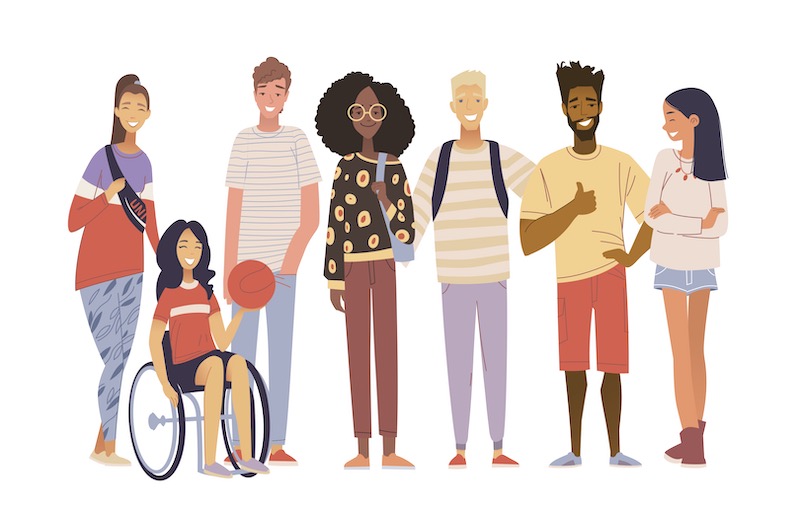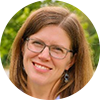Editor’s Note: Today’s post provides an excerpt from a new resource from ACSI Research called “Leading Insights: Special Education and Inclusion.” The full resource is available now from Purposeful Design Publications.
“Nothing about us without us.” This refrain of the disability rights movement underscores the importance of the voice of students with disabilities when educators plan, deliver, and evaluate programs and services. In keeping with this tenet of inclusive education, two alumni of an inclusive Christian school in Michigan participated in a focus group for this monograph.
Alex is a 2017 graduate who is a very social and outgoing adult, and he also has an intellectual disability. He loves music and seeing his friends as well as hanging out with his eight siblings. Abby, a 2012 graduate of the same inclusive Christian school, went on to earn a bachelor of arts in special education from Calvin University in 2016. She currently serves as an inclusive educator at another Christian high school in Michigan. The Christian high school attended by both of these alumni facilitated a robust social inclusion program called Connections, which involved hundreds of student volunteers with and without disabilities in activities like lunch buddies programs, after-school activities, an annual banquet, and peer tutoring.
Both Alex’s and Abby’s experiences suggest that when Christian school leaders and teachers take the time to truly listen to students with disabilities and involve them centrally in their own education, it can have a profound impact on their academic learning, personal and social development, and spiritual growth, as well as on the school community as a whole.

Q: What did you appreciate the most about your high school experience?
Alex: I had some really good friends that were part of Connections. My favorite class was choir and shop. The teachers were the best. I had a solo in the final spring concert. I ran track, the 200- and the 400-meter races. It was really, really fun. The Connections banquet was the all-time high.
Abby: Even before high school, I’d always known that I wanted to be a teacher since I was in first grade. One day in middle school, I got really frustrated with one of my teachers for so often pairing me with students who were struggling. When I asked why, my teacher told me, “Well, Abby, you work really well with people who are different than you and you bring out the best in other people.” And so that got my wheels turning. I’ve always loved everybody. Popularity was never something important to me. So I always just pulled in everybody.
I got involved right away in high school, starting off with Lunch Buddies [an inclusion program that pairs students with and without disabilities for lunch]. I think I spent more lunch hours with students receiving supports than I actually signed up for most weeks. It was just more fun in there! Lunches were an awkward time to begin with, and there was no cafeteria. And so, when you’re standing in the hallway, like, OK, what do I do next? I don’t want to go hide in the bathroom. So I just went to hang out with my buddies. And in my sophomore, junior, and senior years, I was part of the leadership team for Connections, which meant I helped plan all of the events and plan Lunch Buddies and schedule that.
Inclusion has always been part of my schooling experience. I can’t imagine not having different learners in our classroom. It was just so much a part of everyday life. You see everybody in all of your classes. Being lab partners with a student receiving inclusion support when you were in science was no big deal because that’s just how it goes. That was just so much a part of my high school experience that it was normal.
Q: Can you imagine high school without that experience with Connections?
Abby: No, I wouldn’t have had any friends. In high school there can be drama between girls, and Connections was always the place that I knew I could go and be accepted and be loved no matter what. And I would love everybody in there, and people weren’t mean to each other or petty, and there was none of the high school drama. The only drama was if you cheated at UNO. That was the only problem that happened in the room.
Alex: I was friends with Isaac. He is a really cool guy. He was a really great friend. He’s the best. And his mom works with special ed. We would have dinner and go to basketball games. And my friend Jacob went to Connections too. And we had fun at the banquet.
Q: Alex, what was one of the most important things that you learned at school?
Alex: Every day, I learned about the Lord, that He loves me and cares about me. Every, every day. And how to love other people, like your friends. And I love them—love all my friends—a lot.
Q: Abby, what did you as a student need—and what did other students need—in order to create a community of belonging, for students of all abilities?
Abby: The biggest and most important thing was Mrs. Q [special education teacher]—just the support and the encouragement and just the way that she encouraged us all. She made us feel empowered to be able to do things on our own as high schoolers. This was important because high schoolers don’t often feel empowered to do things. But she helped us feel empowered and she gave us leadership responsibilities. I think also the mutual support from everybody in Connections, knowing that was always a place to be safe and be loved. That was huge on both sides. It was always a judgment-free zone.
Q: What are the benefits of inclusive education?
Abby: Definitely richer education and richer friendships. And teachers learn to teach to a variety of abilities. You get things that you don’t get from normal teaching when you’re teaching to someone who struggles. Having people of all abilities made for an incredibly rich community where you felt loved and you felt like you belonged, no matter what your struggle was and no matter what your strengths were. You walk down the hallways and everybody knows everybody. Obviously it’s high school, and so there’s still the high school stuff that happens, but underlying it all is the love for everybody of all abilities.
Alex: For students, if they didn’t go to a Christian school, they might not know that what you learn is the Lord really loves me and cares about me.
Q: Abby, how does inclusive education shape your career path, what you’re doing now, and your faith?
Abby: Inclusive education is just so built into who I am and what I do that it was no question to me. I graduated from Calvin and I knew exactly what I wanted to do. I wanted to do inclusive high school education. I wanted other high schoolers to have the kind of high school experience that I had, where you just have all of those different friends with different abilities. That was what I looked for when I was looking for a job. And that’s where I am now—I’m doing high school inclusion and I’m doing my own version of the Connections program. We call it Sidekicks. I’m seeing friendships develop like the friendships that I had when I was in high school. Seeing just the smiles that come to my students’ faces and my Sidekicks’ faces. Some of the assignments that I give to my Sidekicks, listening to the reflections that they have, about what does it mean to have a friend with a disability? How has this changed how you are a friend to others, or how you even talk to your own friends about disabilities? That has been incredibly powerful to hear students’ mindsets changing.
Q: Why do you think inclusion is important for Christian schools? What would you want to tell leaders of Christian schools about inclusion?
Alex: I tried to do my best every day, for my teachers. I would say students should go to see their principals and get to know them. I knew my principal and would go to see him every day. And principals should include all kids. Maybe support them as a group together, and they can be friends, and tell them that they’re here to support them to have fun.
Abby: It’s especially important for Christian schools because it truly reflects the body of Christ and the way that God has intended our world to be, with all people all together, all worshiping Him. Inclusive education as a whole creates such a rich environment of learning. In my job now, I have seen teachers totally change the way that they’ve been teaching for the last twenty years, because now they have different learners and they’re like, wow, I didn’t realize what I was doing doesn’t actually work for kids. And so they have completely changed their philosophy of education. Inclusive education makes better teachers. It also makes better students. It makes students who are aware of others around them instead of just aware of themselves.
And inclusion just makes for a richer community. Having diversity in all aspects is so important, because it brings perspective and it brings meaning in ways that you don’t have when you have all the same kind of people. That has just been such a solid foundation. And that has meant so much to me growing up and throughout my faith journey. The diversity of the body of Christ is one of my favorite things. Being people of all abilities, of all colors. And having that one solid base that connects us. I mean, there really are no words to describe how amazing that is!
Order your copy of Leading Insights, today!
About the Author
 Elizabeth Lucas Dombrowski is the executive director of All Belong Center for Inclusive Education, equipping congregations and schools to glorify God through purposeful, innovative inclusion of persons of varied abilities. All Belong partners with Christ-centered schools across the country to support their students and welcomes conversations and questions about inclusion of students of all abilities. Elizabeth can be reached at edombrowski@allbelong.org.
Elizabeth Lucas Dombrowski is the executive director of All Belong Center for Inclusive Education, equipping congregations and schools to glorify God through purposeful, innovative inclusion of persons of varied abilities. All Belong partners with Christ-centered schools across the country to support their students and welcomes conversations and questions about inclusion of students of all abilities. Elizabeth can be reached at edombrowski@allbelong.org.

